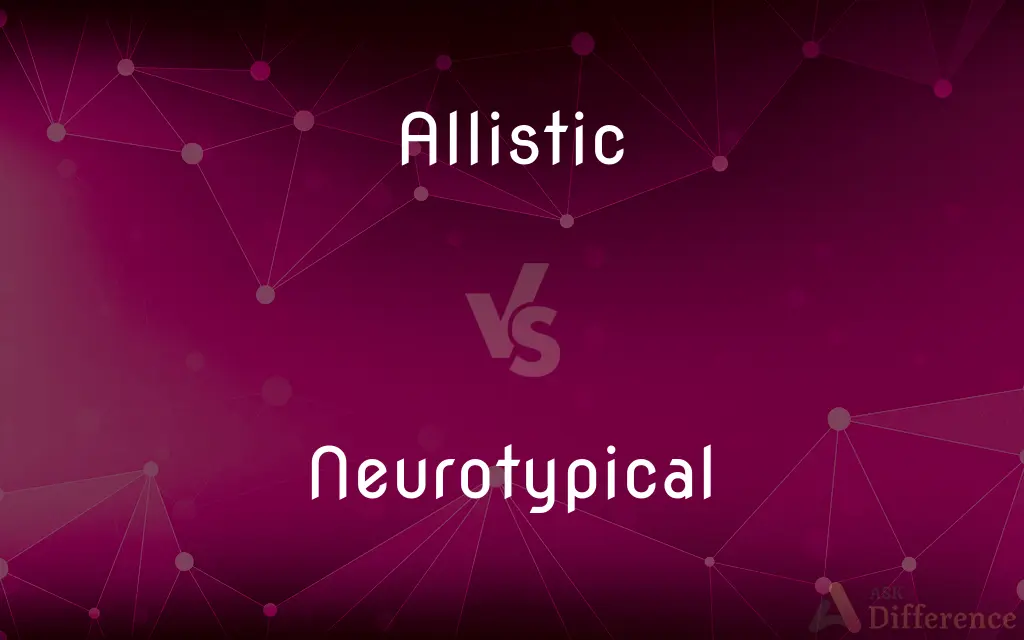Allistic vs. Neurotypical — What's the Difference?
Edited by Tayyaba Rehman — By Urooj Arif — Updated on February 24, 2024
Allistic refers to individuals who are not on the autism spectrum, encompassing a broad range of neurodevelopmental profiles. Neurotypical, describes those whose cognitive and neurological development aligns with societal standards of "normal".

Difference Between Allistic and Neurotypical
Table of Contents
ADVERTISEMENT
Key Differences
Allistic is a term used to describe people who do not have autism, highlighting the distinction without implying a comparison to a 'norm.' It recognizes the vast diversity in human neurodevelopment outside of the autism spectrum. Neurotypical, on the other hand, is often used to refer specifically to individuals whose neurological development and functioning are consistent with what society considers typical or standard.
The concept of allistic covers a broader spectrum, acknowledging that not being on the autism spectrum doesn't necessarily equate to being neurotypical. This distinction is crucial in discussions about neurodiversity, where various neurological conditions beyond autism, such as ADHD or dyslexia, are considered. Neurotypical individuals, by definition, would not typically identify with these conditions, emphasizing a more conventional neurological development.
In societal and interpersonal contexts, the term allistic can foster a more inclusive understanding of neurodiversity by highlighting the absence of autism without defaulting to a normative standard. Neurotypical, however, subtly reinforces the notion of a standard neurological template, which can be limiting in discussions about cognitive and developmental diversity.
The usage of allistic versus neurotypical can reflect one's stance on neurodiversity and inclusion. Utilizing 'allistic' can denote a deliberate effort to acknowledge and respect the wide range of human neurodevelopmental experiences without centering on a norm. In contrast, 'neurotypical' often serves as a benchmark for comparison, potentially overshadowing the rich diversity found within the non-autistic population.
Comparison Chart
Definition
Refers to individuals not on the autism spectrum
Describes individuals with typical neurological development
ADVERTISEMENT
Scope
Broad, excluding autism but inclusive of other neurodivergences
Narrow, aligned with societal standards of "normal" cognitive function
Implication
Neutral, without implying a norm
Implies alignment with a societal norm
Use in Neurodiversity
Emphasizes diversity outside of autism
Often used as a contrast to neurodivergence
Societal Context
Promotes a more inclusive view of neurodiversity
May reinforce conventional notions of neurological development
Compare with Definitions
Allistic
Not specifically aligned with societal norms of cognitive function.
Being allistic does not automatically imply being neurotypical.
Neurotypical
Describes individuals with societal-standard cognitive development.
Neurotypical individuals may not face the same challenges as those with neurodivergences.
Allistic
Can include those with other neurodivergences.
Many allistic individuals identify with conditions like dyslexia or ADHD.
Neurotypical
Can reinforce conventional notions of 'normalcy.'
The term 'neurotypical' can inadvertently marginalize neurodivergent perspectives.
Allistic
A term for individuals who do not fall on the autism spectrum.
Allistic people can have diverse neurodevelopmental profiles, including neurodivergences like ADHD.
Neurotypical
Often used as a baseline for comparing neurological development.
In discussions of autism, neurotypical development is frequently referenced as a contrast.
Allistic
Promotes a broader understanding of neurodiversity.
Using 'allistic' helps acknowledge the wide spectrum of human neurodevelopment.
Neurotypical
Implies alignment with societal norms.
Neurotypical behaviors and processing are often considered the standard in many contexts.
Allistic
Emphasizes the absence of autism without other implications.
Allistic individuals may still experience challenges unrelated to autism.
Neurotypical
Excludes most forms of neurodivergence.
People with ADHD or dyslexia would not typically be described as neurotypical.
Allistic
(neologism) Not autistic.
Neurotypical
Relating to or characteristic of people who do not have a neurodevelopmental disorder, especially autism spectrum disorder
Neurotypical behavior.
Neurotypical
Not having a neurodevelopmental disorder, especially autism spectrum disorder
Neurotypical students.
Neurotypical
Having a normal usual, ordinary way of processing sensory, linguistic, and social information; often to contrast with autistic.
Neurotypical
Neurotypical or NT, an abbreviation of neurologically typical, is a neologism widely used in the autistic community as a label for non-autistic people. It refers to anyone who does not have any developmental disorders such as autism, developmental coordination disorder, attention deficit hyperactivity disorder or obsessive compulsive disorder.
Neurotypical
A person who is neurotypical.
Neurotypical
One who is neurotypical; one who is not autistic, schizophrenic etc.
Common Curiosities
What does allistic mean?
Allistic refers to individuals who are not on the autism spectrum, without implying they fit societal norms of cognitive function.
Is being allistic the same as being neurotypical?
No, being allistic simply means not having autism, while being neurotypical implies alignment with societal standards of neurological development.
What does neurotypical mean?
Neurotypical describes individuals whose cognitive and neurological development aligns with what is considered standard or typical by society.
Can someone be allistic and still have a neurodivergence?
Yes, allistic individuals can have other neurodivergences such as ADHD or dyslexia.
Why is the term allistic used instead of neurotypical?
Allistic is used to inclusively describe those not on the autism spectrum without implying a norm, promoting a broader view of neurodiversity.
Can the use of allistic promote inclusivity?
Yes, using 'allistic' can foster inclusivity by acknowledging neurodevelopmental diversity outside of autism without defaulting to a norm.
How do these terms affect the perception of autism?
These terms help frame autism within the broader context of neurodiversity, highlighting the spectrum of neurological experiences.
Are all neurotypical individuals also allistic?
Yes, neurotypical individuals are also allistic since they do not have autism, but the reverse is not always true.
How are these terms used in the context of autism?
In autism discussions, 'allistic' is used to describe non-autistic individuals, while 'neurotypical' often serves as a contrast to autistic experiences.
What is the significance of understanding these terms in everyday life?
Understanding these terms can enhance awareness and sensitivity towards the diverse range of human cognitive experiences.
How does the term neurotypical impact discussions on neurodiversity?
Neurotypical can reinforce conventional views of 'normal' cognitive function, potentially marginalizing neurodivergent perspectives.
Do allistic people experience cognitive challenges?
Allistic individuals can experience cognitive challenges, especially if they have other neurodivergences.
Is it important to distinguish between allistic and neurotypical?
Yes, distinguishing between the two can lead to a more nuanced understanding and appreciation of neurodiversity.
Can the term neurotypical be considered exclusionary?
Neurotypical can be seen as exclusionary if it's used to uphold a narrow standard of cognitive function, overshadowing neurodivergent perspectives.
Share Your Discovery

Previous Comparison
Jungle vs. Rainforest
Next Comparison
Muscly vs. MuscularAuthor Spotlight
Written by
Urooj ArifUrooj is a skilled content writer at Ask Difference, known for her exceptional ability to simplify complex topics into engaging and informative content. With a passion for research and a flair for clear, concise writing, she consistently delivers articles that resonate with our diverse audience.
Edited by
Tayyaba RehmanTayyaba Rehman is a distinguished writer, currently serving as a primary contributor to askdifference.com. As a researcher in semantics and etymology, Tayyaba's passion for the complexity of languages and their distinctions has found a perfect home on the platform. Tayyaba delves into the intricacies of language, distinguishing between commonly confused words and phrases, thereby providing clarity for readers worldwide.
















































